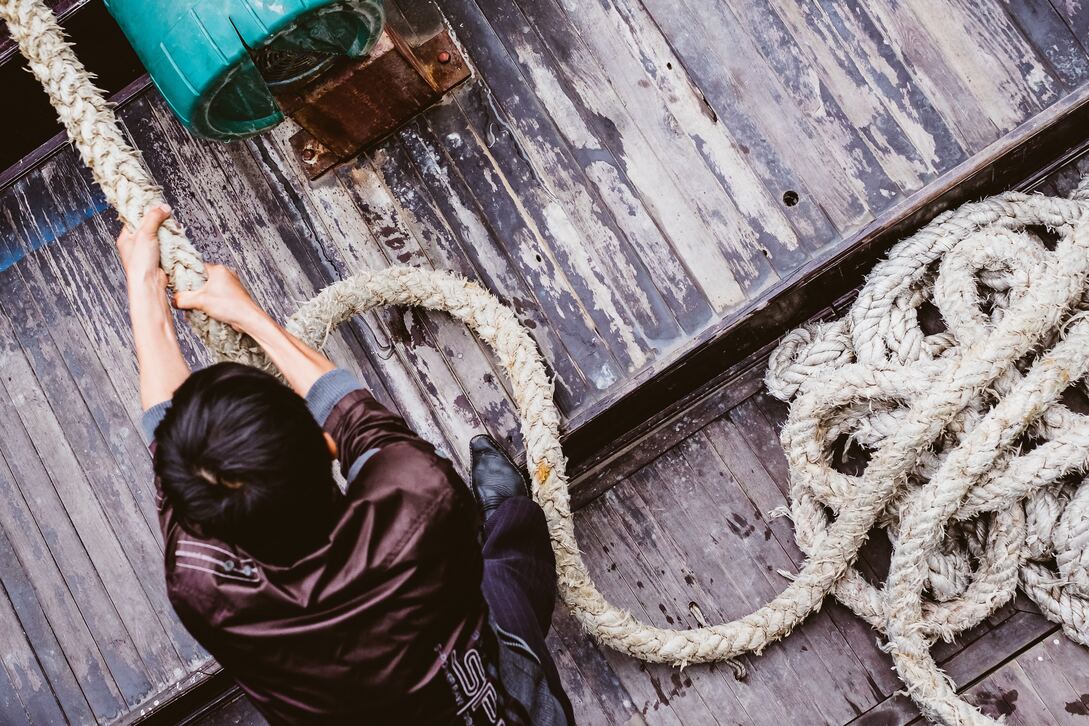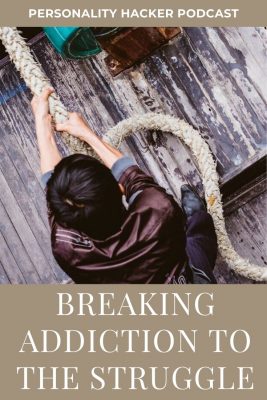Download Episode Here – right click link and select “Save Link As…”
In this episode, Joel and Antonia talk about “the struggle” and how we can overcome our addiction to the control it has over our lives.
In this podcast you’ll find:
- Struggle is our relationship to challenge.
- It is our resistance to a challenge.
- The difference between challenge and struggle is that more resources are required to overcome struggles than challenges.
- When we struggle with something our identity gets wrapped up in it.
- Pain is part of life. You’re always going to have pain.
- Suffering is your response to pain.
- It’s an inability to accept what you’re experiencing.
- Buddha’s concept is to surrender to the pain and not get attached to it.
- Some suffering is elective.
- Some things in life are legitimate struggles.
- Most of us haven’t been able to get to the level of pain tolerance that Buddhist monks can endure.
- There are going to be times when life feels like a struggle.
- Dan’s recent podcast coming close to dying.
- There an addictive quality to struggle and suffering.
- Most of us don’t know what to do when the struggle is removed.
- We become wired in a certain way, and we are always looking for homeostasis.
- We get a temporary feeling of relief once the struggle is gone, but then the brain defaults back to what it is wired to endure.
- You have the wiring for struggle, and so you need to attach that to something else if the initial struggle is removed.
- The world is the best its ever been.
- Problems are being solved.
- What can we do to unhook ourselves from the idea that life has to be a struggle?
- Let people finish thoughts that you find threatening.
- Entertain different viewpoints.
- Religion is good at leveraging this human tendency that struggle gives us meaning.
- Are we disloyal to important causes if we stop struggling?
- We think if we acknowledge that things are good, we will become apathetic and stop making progress.
- Some people conflate gratitude with endorsement.
- Religion teaches us that we need to sacrifice this corporal life in the present for a deferred reward in the future.
- We do it when we’re raising kids too. We don’t live for ourselves. We live for our kids.
- The deferred life program can be done in a multiple of ways.
- Addiction to struggle is another deferred life program, just more secularized.
- The secularized struggle misses out on the grace, mercy, and forgiveness that comes with religion.
- Stop trying to correct everything and just put out the good stuff.
- More demonstration less articulation
- Struggle is a resource hog
- Either go at a challenge directly or go at it bitching and moaning.
- When you hang back from the idea that things have to be a struggle, you can start enjoying life.
- We assign nobility to negative emotions.
- “If you’re not outraged you’re not paying attention.”
- Positivity takes fewer resources.
- If we have negative emotions living within us, we need to process them, but we don’t need to live there.
- Struggle is a noble distraction.
- It’s burning resource for the benefit of your ego.
-
Dave Logan Tribal Leadership
- Level 1: The Universe Sucks – Total negativity. Some people live here but not many
- Level 2: The Universe is okay, but I suck – Eor syndrome. More people live here
- Level 3: I’m awesome; you all suck. The critics live here. This is where the vast majority of people live.
- Level 4: We’re awesome, everyone else sucks. So your group is great, but whoever isn’t in your group sucks.
- Level 5: The universe is awesome. You’re awesome, and I’m awesome.
- Level 5 is where we want to be.
- Level 4 is where corporations strive for because competition sparks camaraderie.
- Struggle gives us a temporary purpose.
- Camaraderie with like-minded individuals.
- Could everybody let go of struggle and hit these challenges more head-on?
- The collective creates too much tribal conflict.
- If you feel you have to struggle until the world gets to the place you want it to be, you are going to stay in perpetual struggle and never experience the life you want.
- The antidote for struggle is gratitude and purpose.
- You can do the things you want to see manifest while still maintaining gratitude and purpose.
- Gratitude = look how far we have come.
- If you can’t see how far we have come, you are intentionally neglecting progress.
- Just because it isn’t your idealized form, you are being wildly inaccurate and not living in reality.
- Gratitude gives us a sense of hope. Things aren’t all doom and gloom.
- Purpose = our dharma picks us; we don’t pick it.
- Surrender to purpose as opposed to shoehorning purpose.
- Purpose doesn’t need to be a struggle.
- Is struggle our synthetic idea of purpose?
- Everybody wants you to be just as outraged as they are.
- Don’t force your dharma on everyone else.
- You aren’t on your dharma if you are trying to force others to see things your way.
- Abandon the struggle and save your resource for your dharma/purpose.
- Say the thing you are struggling for is realized, what comes next?
- Where are you going to channel that fervor?
- What are you trying to accomplish?
- If you are allowing yourself to have an artificial version of purpose, it gets arbitrary real quick.
To subscribe to the podcast, please use the links below:
Subscribe with iTunes
Non-iTunes Link
Soundcloud
Stitcher
Google Play
Spotify
Radio Public
PlayerFM
Listen Notes
If you like the podcast and want to help us out in return, please leave an honest rating and review on iTunes by clicking here. It will help the show and its ranking in iTunes immensely! We would be eternally grateful!
Want to learn more?
Discover Your Personal Genius
We want to hear from you. Leave your comments below…



Share:
Podcast - Episode 0311 - How To Be A Good Critic
Podcast - Episode 0313 - Honoring Personal Thought Leaders
17 comments
You are just perpetuating the privileged point of view. So people who are truly disenfranchised and denied opportunities because of the race, gender, or sexual orientation should just accept, without emotion, that they will always work harder for less? How can anybody just be ok with that? The only way for that to ever change is for people to NOT just be ok with it and constantly challenge the status quo. Self advocacy comes with a cost. It causes suffering but hopefully alleviates something that is causing harm. However, not advocating for yourself perpetuates harm that leads to suffering. So people who are constantly denied health care should just accept that in order to avoid suffering? People who are left behind in society should just accept that in order to avoid the suffering that inevitably comes with fighting?
It is very privileged to think that self advocacy and fighting for equity can happen without suffering.
Hi Joel and Antonia, I enjoy all your podcasts but this one sticks out for me as maybe my favorite ever. It’s a message that isn’t heralded enough in this day and age. I’m an INFP and so I value my peace and strive for it constantly if it’s not present. I choose gratitude every day! I ignore the news because it’s all contentious and bad news, but even looking at the people around me I still see the almost universal struggling and I can’t help but look at it is a choice. I recognize the blind spot that comes from my primary function so even though on one level I can’t imagine how people don’t want inner peace as much as I do, but also am accepting that they simply don’t value it like I do because they’re not wired like I am. Still, I want it for them too and want to demonstrate what choosing not to struggle looks like everyday.
To clarify, that “get off the couch” comment was not meant to be directed at James who, again, I think makes valid points. My thoughts were going to a more broad, social inertia that results from lacking context, such as one would find in a third world lifestyle.
But I also think suffering and pleasure are so relative or subjective. The immigrant working miserable (to us) hours, might be filled with gratitude for the opportunity to work.
Anyway. Very good topic and I definitely was surprised by and related to the idea of being addicted to a struggle rather than allowing for progress as the status quo.
Thanks!
I get where you are coming from, but our problems still fall under “first world problems.” People in the past did not have the luxury of feeling lonely, and frankly I think a majority of the time that is a product of our own making. It isn’t cancer. Want to stop feeling lonely? Get off the couch and attend a meet up. It just requires too much effort to move out of our comfort zone.
Or if you are an introvert like me, you just feel happy to be left alone and unabused. If the price is loneliness for freedom from toxic people, I will take it. Happily. And I would rather be under employed with no savings for an emergency that may or may not ever happen and enjoy the freedom to be my own boss and have time to listen to podcasts and exchange ideas on the internet. Point being we still have the luxury of choice, even if the choice is between crappy or less crappy.
In the past they were too busy dying in childbirth to contemplate crappy choices, ijs.
There’s a difference between processing your emotions and wallowing in them. I think that’s part of the culture today. It’s a part I hate.